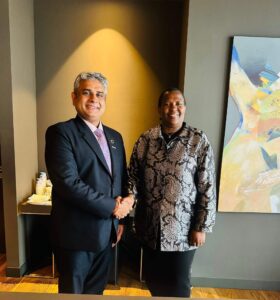FOR IMMEDIATE RELEASE
The AfCFTA Secretariat and AGRA Seal New Partnership to Fast-Track Intra-African Trade and Agricultural Growth
Addis Ababa, Ethiopia | Monday, February 16, 2026. The African Continental Free Trade Area (AfCFTA) Secretariat and AGRA have reinforced their strategic partnership to accelerate intra-African trade, positioning agriculture as a central engine of farmer prosperity, value addition, and regional food security.
At a high-level event on the 14th of February on the margins of the 39th African Union Summit, H.E. Wamkele Mene, Secretary-General of the African Continental Free Trade Area (AfCFTA) Secretariat, and Alice Ruhweza, President of AGRA, formalised this commitment through the signing of a Memorandum of Understanding marking a new phase of cooperation with a strong focus on translating the AfCFTA legal framework into practical outcomes for African agricultural markets.
The partnership comes at a pivotal moment as Africa advances implementation of the AfCFTA Agreement. With 50 countries having ratified the Agreement, attention shifts from legal commitment to practical implementation, particularly in agriculture. “The AfCFTA offers Africa a historic opportunity to shift from exporting raw commodities to building regional value chains that create jobs, raise farmer incomes and strengthen food security,” said H.E. Wamkele Mene. “Our partnership with AGRA is about moving from ambition to execution, ensuring that agricultural trade delivers tangible benefits for producers, processors and consumers across the continent.”
Through the AfCFTA Agri-Trade Action Plan, which proposes several interventions, including, among others, reducing non-tariff barriers, improving trade facilitation, promoting value addition and mobilising investment in regional agricultural value chains, the collaboration will advance agricultural trade under AfCFTA.
“Trade will not transform Africa’s food systems unless farmers and agri-enterprises are able to produce competitively, meet international quality standards, and connect to reliable markets,” said Alice Ruhweza, President of AGRA. “This partnership is about making intra-African food trade work in practice—linking policy to delivery so that agriculture becomes a driver of inclusive growth, resilience and shared prosperity.”
Together, the AfCFTA Secretariat and AGRA will drive this partnership toward practical, farmer-centred action, enabling agriculture to fully leverage integrated African markets and deliver inclusive growth, resilience, and shared prosperity across the continent.
Media Contact For interviews and media enquiries, contact: media@agra.org | +254 703 033000
About AGRA
AGRA is a proudly African-led institution focused on scaling agricultural innovations that help smallholder farmers towards increased incomes, better livelihoods, and improved food security. Since 2006, AGRA has worked with its partners, governments, non-governmental organizations, private sector businesses, and more; to deliver a set of proven solutions to smallholder farmers and indigenous African agricultural enterprises. AGRA catalyzes and sustains an inclusive agricultural transformation aimed at increasing incomes and enhancing food security in 12 countries.
For more information, visit agra.org
About the African Continental Free Trade Area (AfCFTA)
The African Continental Free Trade Area, established in 2018, aims to create a single market for goods and services across Africa, promote economic integration among African Union Member States, and significantly increase intra-African trade to support sustainable development.



